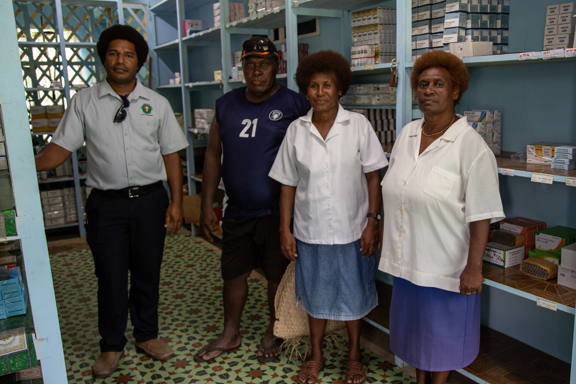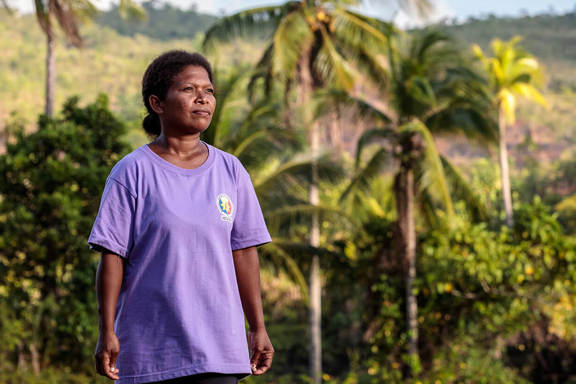Global Issues
Understanding and Preventing Childhood Diseases
A Comprehensive Guide to Children and Adolescent Health. Childhood diseases are a major global health concern, affecting millions of children each year.

Ronita (22) smiles as she holds her sons, Egzy Grey (3) and Clark (5), in their small home in Quezon City, Philippines. Photo: Richard Wainwright/Caritas Australia
Impact on Children
Childhood illnesses not only pose immediate threats to children's well-being but can also have long-term impacts on their growth, education, and overall quality of life.
Caritas Australia works tirelessly to address the root causes of childhood diseases through education, prevention, and healthcare initiatives that empower vulnerable communities worldwide.
What Are Childhood Diseases and Why it is Important to Tackle Them?
Childhood diseases encompass a range of illnesses, from common infections to chronic conditions, that significantly impact children's health and development. Addressing these diseases is critical for ensuring every child has the opportunity to grow, thrive, and contribute to their communities.

Thandolwayo (9) washes her face from the new water pipe. In June 2017, Caritas Hwange, a Caritas Australia partner, installed a solar powered piped water system in Msuna Hills bringing fresh clean drinking water to the population for the first time. Photo: Richard Wainwright/Caritas Australia.
Vulnerability
Children's developing immune systems make them more susceptible to infections and illnesses.

Talaso is a mother of two living in Marsabit, northern Kenya. Photo: Thom Flint/CAFOD
Global Impact
In developing regions, childhood diseases contribute significantly to mortality rates, hindering social and economic progress.

Priscilla walking her grandchildren to school. Photo: Richard Wainwright/Caritas Australia
Preventability
Many childhood illnesses can be prevented through vaccines, proper nutrition, and access to basic healthcare.
Overview of Common Childhood Diseases
Respiratory Infections
- Overview - Diseases like pneumonia are among the leading causes of death in children under five globally.
- Symptoms - Cough, fever, difficulty breathing.
- Prevention - Vaccines (e.g., pneumococcal and Hib vaccines), improved sanitation, and prompt medical care.
Diarrhoeal Diseases
- Overview - These diseases, often caused by poor sanitation and unsafe drinking water, are a major threat to child health.
- Symptoms - Dehydration, loose stools, abdominal pain.
- Prevention - Access to clean water, hygiene education, and oral rehydration therapy (ORT).
Malaria
- Malaria is a preventable but deadly disease affecting millions of children in tropical regions annually.
- Symptoms - Fever, chills, fatigue.
- Prevention - Use of insecticide-treated nets, anti-malarial medications, and community education.
Vaccine-Preventable Diseases
- Diseases such as measles, polio, and tetanus remain prevalent in areas with low vaccination rates.
- Symptoms - Rash, fever, and, in severe cases, paralysis or death.
- Prevention - Comprehensive immunisation programs.
The role of nutrition in preventing childhood diseases malnutrition is a key factor that exacerbates the risk and severity of childhood diseases.
Proper nutrition strengthens immune systems and aids recovery from illnesses.
Micronutrient Deficiencies
Vitamin A, iron, and zinc deficiencies are common in Stunting and Wasting
Chronic malnutrition
impacts physical and cognitive development.
Preventing Childhood Diseases
Caritas Australia adopts a holistic approach to childhood health, combining education, infrastructure improvements, and emergency response programs to address the root causes of diseases.
WASH Initiatives
Water, Sanitation, and Hygiene (WASH) programs aim to improve access to clean water and sanitation facilities while promoting hygiene education. Example - Installing water filtration systems in rural schools of Samoa to prevent waterborne diseases.
Health Education
Caritas Australia conducts community workshops to educate families on disease prevention, hygiene practices, and the importance of early detection.
Emergency Healthcare Support
During crises such as natural disasters, Caritas Australia provides emergency medical care and supplies to protect vulnerable children from outbreaks.
Support our Health Education programs Donate Now
Donate NowChildhood Health Challenges in Developing Regions

Limited Access to Healthcare Challenge
In remote areas, children often lack access to basic medical services. Caritas Australia's Role - Establishing mobile health clinics and training local healthcare providers.

Climate-Driven Health Risks
Climate change increases the prevalence of vector-borne diseases like malaria. Caritas Australia's Action - Implementing climate-resilient health strategies, such as early warning systems and community education.
How You Can Support Our Mission
Donate Today
Your donations help fund critical health programs, including nutrition education and emergency medical care.
Become a Champion for Change
By signing up to become a Champion for Change, your monthly gifts can help transform lives today, tomorrow and every day.
$65 a month can procure and distribute 800 food baskets for drought-affected communities.
Give a Global Gift
Celebrate special days with a gift that gives back.
Each card makes a difference by supporting transformative global programs.
FAQs
Respiratory infections, diarrhoeal diseases, and vaccine-preventable illnesses like measles and polio.
Vaccinations, proper hygiene, and ensuring access to clean water are vital prevention measures.
Caritas Australia implements nutrition programs and health education workshops.
A balanced diet boosts immunity and helps prevent malnutrition-related illnesses.
Caritas Australia focuses on providing equitable access to healthcare in low-income regions.
Rising temperatures increase the prevalence of vector-borne diseases such as malaria.
By donating, fundraising or advocating for our initiatives.
Educational workshops, access to healthcare, and clean water initiatives.
By training local healthcare workers and empowering communities with long-term climate resistant solutions.












